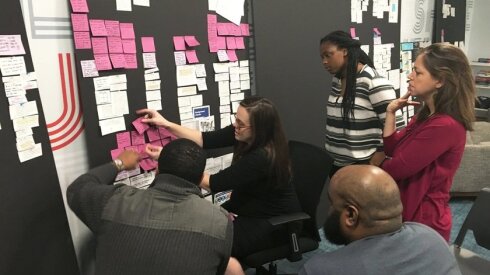Civic Innovation
-
The City Council has approved three contracts to replace its veteran accounting, payroll and human resources management software. A consulting firm will help with oversight and advisory services.
-
The Marin County Digital Accelerator takes an agile approach to gov tech, moving fast to get work done. A recent project found a “single source of truth” to modernize planning and permitting.
-
The Bismarck Municipal Court system handled nearly 87,000 new cases from 2020-2024 and saw a 40 percent caseload increase in 2024. Officials are examining what systems might be upgraded to handle the additional burden.
More Stories
-
Plus, the CA.gov redesign is now underway; new tools created to help address online misinformation; Census State Data Centers are offering localized training resources for community groups; and more!
-
By tapping human-centered design principles, the i-Team in Durham, N.C., has helped the district attorney remove 51,000 charges for 35,000 individuals, many of whom were facing restricted driving privileges.
-
Students at Carencro High in Louisiana are helping to catalog litter around Lafayette Parish by using a new survey app that allows them to upload their findings into an interactive storytelling platform.
-
Plus, New Yorkers are battling bad landlords with open data; the Hard to Count Census map has added new contact strategy data; a grant from the Knight Foundation seeks data for civic engagement stories; and more.
-
The Louisiana Department of Health has partnered with vendor MAXIMUS to streamline Medicaid enrollment, creating the Healthy Louisiana app. Eligible residents can use the app to compare health-care plans and find doctors.
-
A Charlotte nonprofit is working on creating a Web tool that will map all food sources in a multicounty region, hoping to create a resource for locating local markets, community gardens, farms and more.
-
Speaking at the NASCIO conference last month, Wisconsin CIO David Cagigal talked about the data analytics work the state will undertake when it gets past its current state of being “data rich and information poor.”
-
Nearly half of the people released from prison in North Carolina are arrested again within two years of re-entering society — a troubling statistic that the state is trying to chip away at with new technology.
-
After the successful creation of a new city website built with sophisticated human-centered design methodology, City Hall is now looking to apply the lessons learned to other projects across agencies.
-
As an increasing number of cities nationwide work to foster equitable outcomes for residents, Albuquerque has created a new case study for how data can be used in various ways to lift populations up.
-
Plus, Sidewalk Labs shares its Digital Innovation Appendix; Minnesota rolls out a plan to reduce bench warrants via text; Miami shows off new website upgrades; Pittsburgh uses innovation to support the Census; and more!
-
Mayor Kevin Faulconer appointed Andrell Bower as the city's new chief data officer, a position that has remained vacant since July. Bower is charged with evaluating new tech to streamline government processes.
-
A Vermont Code for America brigade, Code for BTV, designed a Google Chrome extension to scrape data from criminal dockets found on the state's legacy court database to autofill expungement and record sealing petitions.
-
Experts in the local government privacy space say they are paying close attention to how the Census will share data about the population while making it so individuals can’t be identified.
-
Submitting an anonymous crime tip or looking up the whereabouts of local sex offenders just got a whole lot easier with the recent introduction of a cellphone app by the Portage police department.
-
Voting machines rebooted in the middle of voting. Computers couldn’t program the cards voters use to activate voting machines. One voter inserted a driver’s license into the voting machine, causing it to go blank.
-
New technologies, including electronic warrants and remote first court appearances during holidays and weekends, have eliminated a sizable chunk of paperwork for the judges in St. Johns County, Fla.
-
The film, which is titled Code & Response, is part of a larger effort by IBM to help foster and support projects aimed at helping communities prepare for and recover from a global spike in natural disasters.




















